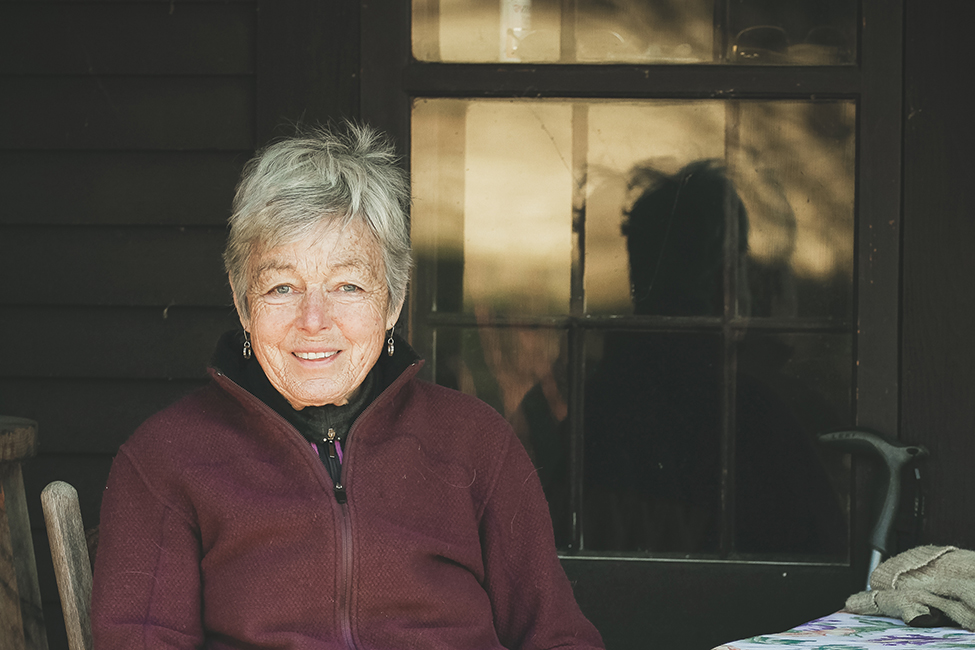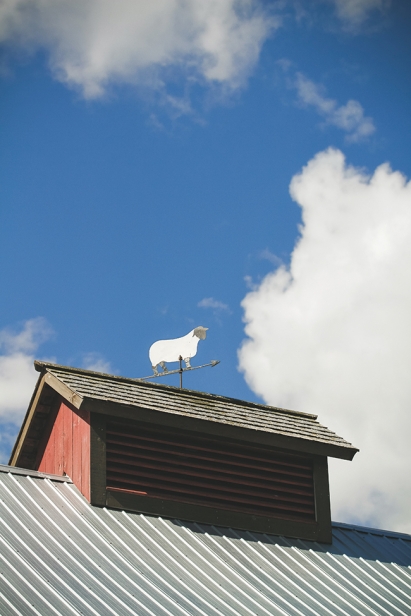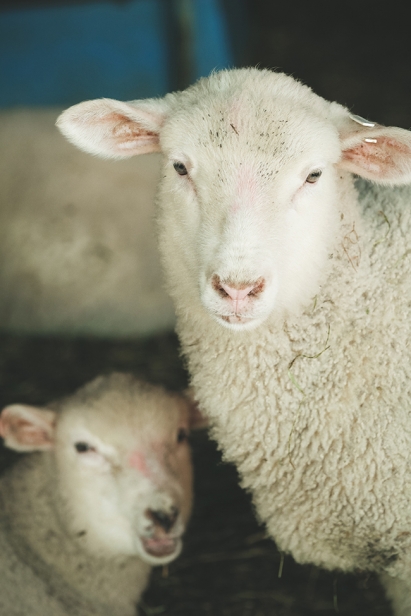MOUNTAIN PEAK
Bambi Freeman
It is early April and I am creeping down a driveway in Stowe, obeying a sign that reads, “Slow! Chickens, cats, dogs, sheep & one old lady. Sterling Brook Farm.” I reach the house, get out of the car and teeter down an icy path toward a barn where I hear, “Halloo.” Poking into the barn, built circa 1840, I round the corner to find the “old lady,” Bambi Freeman, toting a bucket of water for her lambs.
“The pump has been frozen since January,” she explains, motioning to the blue spigot in the corner.
“Can I help you?” I ask, noticing she has the bucket in one hand and a cane in the other.
“Oh, no,” she says, smiling, “I’m just about done,” and I glance at a sled by the door piled with six empty buckets. She moves slowly but there is power in her stride, and one would not doubt that this 76-year-old woman could likely haul buckets full of water all day if she could do it at her own pace. The barn is old but the stalls are laid out with fresh hay for the new lambs, and even on this still-frigid spring morning, it looks clean and cozy. Everything is tidy and in good repair, a sign of a farmer who has pride of place.
“Let’s go in to the house to talk where it’s warmer,” she suggests, and I follow her back over the icy path to her farmhouse across the yard. My instinct is to take her elbow for assistance but I remind myself that Freeman has been doing this by herself for many years. Her age and agility are not the most impressive part of Bambi Freeman, though. In point of fact, this woman has battled multiple sclerosis (MS) for 31 years and, though she endures partial paralysis in half her body, still manages a successful farm on her own.
Freeman’s story was first captured in Peter Miller’s beautifully photographed book Vermont Farm Women, published in 2002. In it, Miller explains how Freeman and her husband went from ski bums to sheep farmers in the 1970s. They both had other jobs as well, but the sheep were largely under Bambi’s care since her husband traveled a great deal. She had no idea she was ill until one morning in 1984 she woke up to find she was paralyzed from the chest down. She had an attacking type of MS and spent six weeks in the hospital working to regain control of the right side of her body. She couldn’t walk, much less take care of a flock of sheep, and so they were sold while she concentrated on regaining strength and muscle control. Around that same time she went through a divorce, and her children, though helpful, were entering adulthood and starting lives of their own. Friends and family helped when they could, but Freeman had to learn how to manage her disability so she could return to being the independent farmer she wanted to be.
The largest obstacle was the permanent partial paralysis on her right side. (If one thing could be said to be lucky in the whole ordeal, it is that she is a lefty.) Freeman had to retrain herself to conscientiously move her right hand and foot rather than rely on the automated response that most of us enjoy.
“Sometimes,” she says, “in order to get my leg to move, I have to look at it and touch the thigh to tell my brain to move it.”
She slowly regained her mobility, but farming is a notoriously physical job. It was one thing to walk again, but how was she going to handle climbing ladders and hauling feed?
“MS didn’t deter me,” she explains, “I just found things to make it work.” For example, one of the chores that requires dexterity is climbing in and out of a truck to unload goods for market.
Freeman found a company that makes fold-up stairs that fit on the tailgate of the truck. She also installed a pull-out railing along the side to hold onto when she climbs the stairs. She relies heavily on her collie, Fergus, to round up the sheep, and in the paddock is an enormous guard dog named Quaker who stays with the sheep at all times. For heavy lifting, she has a man come by for an hour every afternoon to handle the tasks she can no longer do. Her son, Scott, who lives with her, also helps when he can.
More recently Vermont AgrAbility stopped by to see about other changes she can make. Vermont AgrAbility is a program out of University of Vermont that provides free consultation to farmers with disabilities and helps them find ways to continue farming. The consultant assessed Freeman’s situation and came up with a long list of suggested changes to keep her safe and working. Freeman appreciated the advice but asked where the money was going to come from to pay for them. The program only provides assessments, not funding, but luckily one of the people involved in the program, Tom Younkman, also attended Freeman’s church. Another parishioner from the church had a brother who was recently diagnosed with MS and she wanted to donate money to an MS-related cause. Younkman suggested she might direct the funds to help pay for the changes needed on Freeman’s farm to keep her independent. This proposal sat very well with the donor, and now Freeman has a sturdy staircase leading to the hayloft in place of the old, tippy ladder.
By all appearances the farm is thriving. Freeman has 50 lambs and ewes at the height of the season. This is down from the 150 sheep she used to tend.
“More than a hobby but at a level I can handle by myself,” she explains.
To make up for the lost income from fewer sheep, she raises four flocks of 100 meat birds in succession throughout the summer; she also maintains a flock of 26 laying hens year round. Freeman attends the Waitsfield, Waterbury and Stowe farmers’ markets in the summertime and sells directly from her farm throughout the year. She has been at the Stowe market since it started 29 years ago, and she says the customers and other market vendors are like family to her. She has repeat customers every week whom she enjoys chatting with and comparing recipes. Freeman admits that not all farmers are people-oriented but she loves the chitchat.
“It’s my social life,” she explains. “Otherwise I’d be stuck on the farm by myself.”
Part of her success at the market has been educating her customers about how to prepare lamb. She feels that too many Americans still cling to an image of lamb as being gamey and tough. She blames this misconception on the government during World War II that ordered canned mutton from Australia as part of every soldier’s ration kit. The potted meat was reportedly dreadful and left a bad impression of lamb for many generations after. Freeman has spent a great deal of time explaining to customers how to cook the meat so it would not dry out or overcook. She also developed a sausage with the lesser cuts, taking three years working with a butcher to get it just right. She brought the sausages to market along with a grill and cooked them up for sale and sampling. They were a hit and now constitute one-third of her sales.
Given Freeman’s age, one might expect her to consider retirement or at least move someplace that doesn’t have icy pathways. The only change she is considering is to move the timing of the lambing period from February to March. Lambing in the record cold temperatures of recent winters wore her down, and she feels that in order to continue raising lambs, she is going to have to shift the breeding cycle to a more human-friendly schedule. But aside from wanting what every farmer wants (“A new four-wheel-drive tractor would be nice”), she is content with the status quo.
“I don’t see myself going anywhere or doing anything different,” she says. Sixteen years previous, she took a break and traveled around the world by herself. It was a wonderful trip, she claims, but she truly loves what she does and has a group of caring family and people right where she is. She quotes Theodore Roosevelt to explain her feelings on the matter: “Far and away the best prize that life has to offer is the chance to work hard at work worth doing.”
As for her disease, farming turned out to be not a burden but her salvation. I ask if she thinks that a steady diet of lamb meat has anything to do with her continued good health. She says that most certainly, the low-fat, 100% grass-fed meat is very nutritious. Having access to free-range chicken and eggs, not to mention all of those luscious market vegetables, has also contributed. But it is clear that farming itself deserves a great deal of the credit for keeping the debilitating aspects of MS in check.
“Farming has kept me going, being active.”
With flocks to tend and chores to be done, there is no taking a day off from physical activity and she credits the daily exercise with keeping her healthy. In fact she says she hasn’t seen her neurologist in over 17 years. The only time she has even been in contact with him was to get a letter from him to excuse her from jury duty. She was called up for duty at the height of lambing season last year and explained quite simply, “I can’t be going to jury duty then. I have a farm to run.”
Laura Sorkin thinks Bambi Freeman is the walking definition of moxie.







